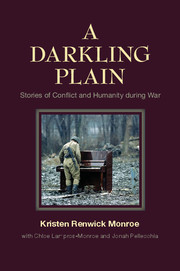Book contents
- Frontmatter
- Epigraph
- Contents
- Preface
- Introduction
- Part one War is a Terrible Thing!
- Part Two Guarding One’s Humanity During War: World War II
- Part Three Other Voices, Other Wars: From Indochina to Iraq
- Part Four Civil Wars and Genocides, Dictators and Domestic Oppressors
- 13 Grandfather Had his Head cut off
- 14 A Resistance to Keep You Alive
- 15 Stuck in the Mud in the Middle of a Civil War
- 16 Too Much was Seen
- 17 Care about other People
- 18 People Suffered Great Loss
- 19 Religion Mixed with Politics Creates Bad Things
- Part Five My Story, Your Choice How to Use it
- Conclusion
- Bibliography
- Acknowledgments by the Senior Author
- Index
17 - Care about other People
Okello and Idi Amin's Uganda
Published online by Cambridge University Press: 05 October 2014
- Frontmatter
- Epigraph
- Contents
- Preface
- Introduction
- Part one War is a Terrible Thing!
- Part Two Guarding One’s Humanity During War: World War II
- Part Three Other Voices, Other Wars: From Indochina to Iraq
- Part Four Civil Wars and Genocides, Dictators and Domestic Oppressors
- 13 Grandfather Had his Head cut off
- 14 A Resistance to Keep You Alive
- 15 Stuck in the Mud in the Middle of a Civil War
- 16 Too Much was Seen
- 17 Care about other People
- 18 People Suffered Great Loss
- 19 Religion Mixed with Politics Creates Bad Things
- Part Five My Story, Your Choice How to Use it
- Conclusion
- Bibliography
- Acknowledgments by the Senior Author
- Index
Summary
From 1971 to 1979 Uganda was ruled by Idi Amin Dada, a military leader in the British colonial regiment known as the King's African Rifles, where he rose to the rank of Major General and Commander of the Ugandan Army before taking power in a 1971 coup. Idi Amin was one of the most notorious of the post-independence dictators in Africa, called the “Butcher of Uganda” for his brutal, despotic rule. Estimates of the carnage under Amin range from 100 thousand to half a million opponents killed, tortured, or imprisoned. Amin's rule was characterized by massive human rights abuse, ethnic persecution, nepotism, corruption, and political repression, including extrajudicial killings. Despite Amin's brutal crushing of opposition, dissent continued within Uganda. After Amin attempted to annex the Kagera province of Tanzania (1978), the Uganda–Tanzania War broke out and led to his downfall. Amin fled to Libya and Saudi Arabia, where he died in exile on August 16, 2003.
I am Okello, born in Gulu, Uganda, on August twenty-fourth, 1955. In my immediate family I have ten siblings. Six boys, five girls. I am number four. That is my immediate family. My parents are both dead. Three of my brothers and three sisters are alive; four are dead.
- Type
- Chapter
- Information
- A Darkling PlainStories of Conflict and Humanity during War, pp. 232 - 237Publisher: Cambridge University PressPrint publication year: 2014



